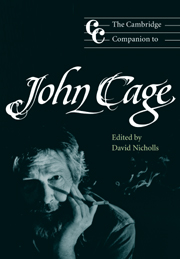Book contents
10 - Cage and Tudor
from Part III - Interaction and influence
Published online by Cambridge University Press: 28 September 2011
Summary
“The world is immense through him, has no limits, has only inviting horizons”
(Cage on Tudor, Quoted in Duckworth 1989, p. 27)John Cage often noted that all of the music he composed between 1951 and the end of the 1960s was written with one person in mind, the pianist and composer David Tudor (1926–96). Unique among Cage's many collaborators, Tudor was a driving force, in ways both concrete and intangible, in the development of Cage's music during its most revolutionary phase, a phase that began soon after Tudor appeared at a pivotal moment in Cage's career.
Cage and Tudor first met at the end of 1949, when the composer was looking for a pianist to make a rehearsal recording for Merce Cunningham. As Cunningham's accompanist, Cage would normally have taken on this task himself. But the piano reduction of Ben Weber's Ballet, Op. 26, subtitled “The Pool of Darkness,” lay beyond his abilities at the keyboard, so he looked for help. His search took him to the dance studio of his friend and colleague Jean Erdman, who introduced him to her accompanist, the twenty-four-year-old David Tudor. Cage had recently heard Tudor and Frances Magnes perform Stefan Wolpe's Sonata for Violin and Piano, and he knew that the pianist was capable of negotiating music far more difficult than Weber's Ballet. Subsequently, he appeared at the door of Tudor's apartment on the lower east side of Manhattan with his request. Tudor consented and, Cage later recalled, played the score with such beauty that Cage was surprised to learn that Tudor disliked it intensely.
- Type
- Chapter
- Information
- The Cambridge Companion to John Cage , pp. 169 - 185Publisher: Cambridge University PressPrint publication year: 2002
- 3
- Cited by



